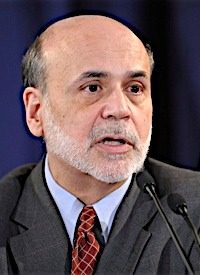
“We are also looking very carefully at inflation,” Bernanke told reporters, adding that “inflation, is at least temporarily higher being driven by gasoline prices and some other commodity prices. Our expectation is that inflation will come down towards a more normal level.”
The Federal Reserve reported an expectation of 2.1-2.8 percent for 2011, which is an increase of almost a full percentage point from its January projections. But the Fed measures inflation differently from consumers, and even from other federal agencies, as it discounts increases in food and energy prices from its calculations. The Consumer Price Index (CPI) as tracked by the U.S. Department of Labor increased 0.5 percent for March alone, and has tracked at nearly a six percent annual rate since the beginning of the year.
On the economy, Bernanke said, “We are in a moderate recovery. We’ll be looking very carefully, first, to see if that recovery is indeed sustainable, as we believe it is.”
The Federal Reserve Bank’s Open Market Committee that Bernanke chairs reported it will keep “maintaining its existing policy of reinvesting principal payments from its securities holdings and will complete purchases of $600 billion of longer-term Treasury securities by the end of the current quarter [and] will maintain the target range for the federal funds rate at 0 to 1/4 percent.”
Bernanke added that the Fed will not expand the “quantitative easing” program whereby they buy U.S. debt securities, though he also said the Fed would not sell off any time soon the securities they’ll finish buying by June. “We are going to complete the program at the end of the quarter, $600 billion. We are going to do that pretty much without tapering. We are just going to let the purchases end.” Bernanke also claimed the end of quantitative easing would be “unlikely to have significant effects on financial markets or on the economy.”
But the specter of U.S. Representative Ron Paul, a persistent critic of Fed policy and author of a book entitled End the Fed, was a silent and unnamed factor in the press conference. CNBC host Steve Liesman asked Bernanke: “There are critics who say that Fed policy has driven down the value of the dollar, and a lower value to the dollar reduces the American standard of living. How do you respond to the criticism that essentially [says] Fed policy reduces the American standard of living?” The question could easily be seen as a code word for Rep. Paul, who has for several years labeled the flight from the dollar to commodities as a “dollar crisis” and warned of expanding inflation. Rep. Paul has also called for more openness in the Fed, and the press conference may have been a sop thrown to the Texas Republican who chairs the House subcommittee that oversees the Fed.
Rep. Paul’s predicted “dollar crisis” appears to be beginning. Commodities have continued to soar in recent weeks, as investors seek a hedge against expected inflation. This may be part of the reason for the spike in oil and food prices, as commodities have increased across the board. Indeed, oil has not even increased at pace with many other commodities. Gold is up about only 30 percent in the past year, but silver has more than doubled, corn is up 74 percent and wheat has doubled.
Asked about the recent Standard & Poor’s downgrade of its U.S. credit rating to “negative” on its top AAA credit rating, Bernanke admitted the nation has “a fiscal deficit which is simply not sustainable over the long term.” Nor did he see that budget cuts that had already been made would change the crisis: “The cuts that have been made so far don’t seem to us to have very significant consequences for short term economic activity.”
Photo of Ben Bernanke: AP Images



